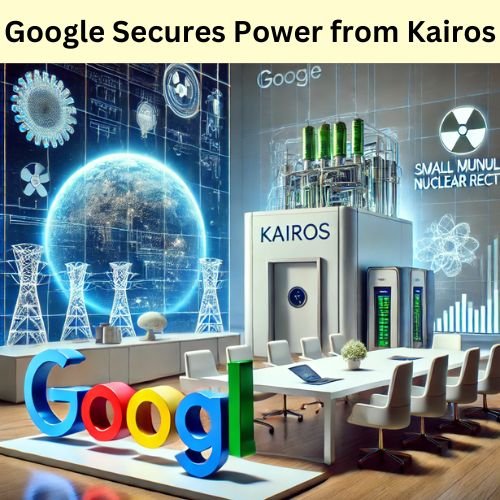Introduction
Hey there, tech enthusiasts and eco-warriors! 🌍✨ We’ve got some exciting news that’s lighting up the energy world! Google, the tech giant known for its innovative spirit, is stepping up its commitment to sustainable energy by partnering with Kairos Power, a trailblazer in the nuclear energy sector. Together, they are embarking on a journey to harness power from small modular reactors (SMRs), marking a significant leap toward a greener future. This partnership isn’t just a game-changer for Google; it’s a bold statement about the potential of nuclear energy in a world striving for sustainability. Let’s dive into what this all means!
Imagine a world where technology and clean energy go hand in hand—where your favorite apps run on renewable sources, and the planet gets a much-needed break from pollution. With this collaboration, Google aims to secure a reliable energy supply for its massive data centers and artificial intelligence operations, showcasing that the tech industry is serious about cutting down its carbon footprint. So grab your reusable water bottle, and let’s explore the fascinating details of this partnership!

Understanding Small Modular Reactors (SMRs)
Now, let’s break down what small modular reactors actually are! SMRs are a new breed of nuclear power plants designed to be smaller, safer, and more adaptable than traditional reactors. These nifty little powerhouses can produce anywhere from 50 to 300 megawatts of electricity—perfect for meeting the growing energy demands without the hefty size of conventional plants. Think of SMRs as the compact, stylish handbags of the nuclear world; they pack a punch without taking up too much space!
One of the most exciting aspects of SMRs is their inherent safety features. These reactors are designed to shut down automatically in emergencies, reducing the risk of accidents. Plus, they can be deployed in various locations, including remote areas that might not have access to traditional energy sources. With the ability to be constructed in factories and then transported to sites, SMRs offer flexibility that’s hard to beat. They represent a shining beacon of hope for countries and companies looking to transition to cleaner energy solutions, and now, Google is at the forefront of this transformation!
Google’s Energy Needs for AI
Let’s talk about Google’s energy needs—because they are no small feat! As one of the largest tech companies in the world, Google operates an extensive network of data centers that consume a massive amount of energy. With the increasing reliance on artificial intelligence and machine learning, the demand for power is soaring higher than ever. The company is committed to maintaining its position as a leader in sustainability while ensuring that its services remain efficient and reliable.
By partnering with Kairos, Google is not just seeking a temporary fix; it’s investing in a long-term solution to its energy challenges. This collaboration allows Google to tap into the clean, reliable power generated by SMRs, ensuring that its AI operations run smoothly without compromising the environment. Imagine the satisfaction of knowing that the cool features of Google Assistant or the fascinating insights of Google Search are powered by clean energy! It’s a win-win for everyone involved, and it sets a fantastic example for other companies to follow.
Details of the Partnership
Now, let’s get into the juicy details of this exciting partnership! Google and Kairos have inked a power purchase agreement that allows Google to buy energy directly from Kairos’s small modular reactors. This deal not only signifies Google’s commitment to sustainability but also shows how serious they are about finding innovative energy solutions. The agreement includes specific terms that ensure a steady and reliable power supply tailored to Google’s operational needs, which is essential for a company that thrives on efficiency and reliability.
What’s even cooler is that this collaboration might involve cutting-edge technologies and research opportunities that can enhance the capabilities of SMRs. Google’s expertise in data analysis and artificial intelligence could be a game-changer for optimizing reactor operations, improving safety measures, and increasing energy efficiency. It’s a beautiful synergy of tech and energy, working together to pave the way for a greener tomorrow. Who knew nuclear energy could sound this exciting?
Impact on the Energy Sector
The impact of this partnership reaches far beyond the walls of Google and Kairos. By embracing small modular reactors, they are helping to reshape the nuclear energy landscape. Many people still harbor misconceptions about nuclear energy, often associating it with risks and environmental concerns. However, this collaboration highlights the potential of modern nuclear technology to deliver clean energy while addressing those concerns head-on. With prominent companies like Google backing SMRs, it could encourage others in the tech industry to explore nuclear as a viable energy source.
Moreover, this partnership might inspire policymakers to implement supportive regulations and incentives for nuclear energy development. As more companies join the movement toward sustainability, the energy sector could see a significant shift. This transition could not only help reduce carbon emissions but also create new job opportunities in nuclear technology, engineering, and research. It’s a powerful ripple effect that could lead to a brighter, more sustainable future for everyone.
Environmental and Economic Implications
Let’s take a moment to appreciate the environmental benefits of this collaboration. By harnessing the power of small modular reactors, Google is making a substantial commitment to reducing greenhouse gas emissions. Unlike fossil fuels, nuclear energy produces minimal carbon emissions during its operation. This shift toward SMRs can help mitigate climate change, making our planet a healthier place to live for future generations. Just think about how amazing it feels to contribute to something that benefits the environment!
But it’s not just about being eco-friendly; there are economic implications to consider as well. Investing in small modular reactors can lead to job creation in various fields, from engineering to construction and maintenance. As the demand for nuclear technology grows, educational programs can expand, leading to a more skilled workforce ready to tackle the energy challenges of tomorrow. This partnership has the potential to drive innovation and economic growth in communities, all while powering the tech revolution with clean energy!
Conclusion
In summary, Google’s partnership with Kairos Power to harness energy from small modular reactors is a thrilling step toward a more sustainable future. This collaboration exemplifies how technology and clean energy can work together to create a greener planet. By securing a reliable energy source, Google is not only fulfilling its operational needs but also setting a stellar example for other companies to follow.
As we look ahead, it’s exciting to think about the possibilities this partnership opens up. The energy landscape is evolving, and with innovative solutions like small modular reactors, we can take significant strides toward a sustainable, energy-efficient future. So here’s to Google, Kairos, and the bright future they are creating together! Let’s embrace this change and cheer on all the efforts to make our planet a better place for generations to come! 🌱💚
